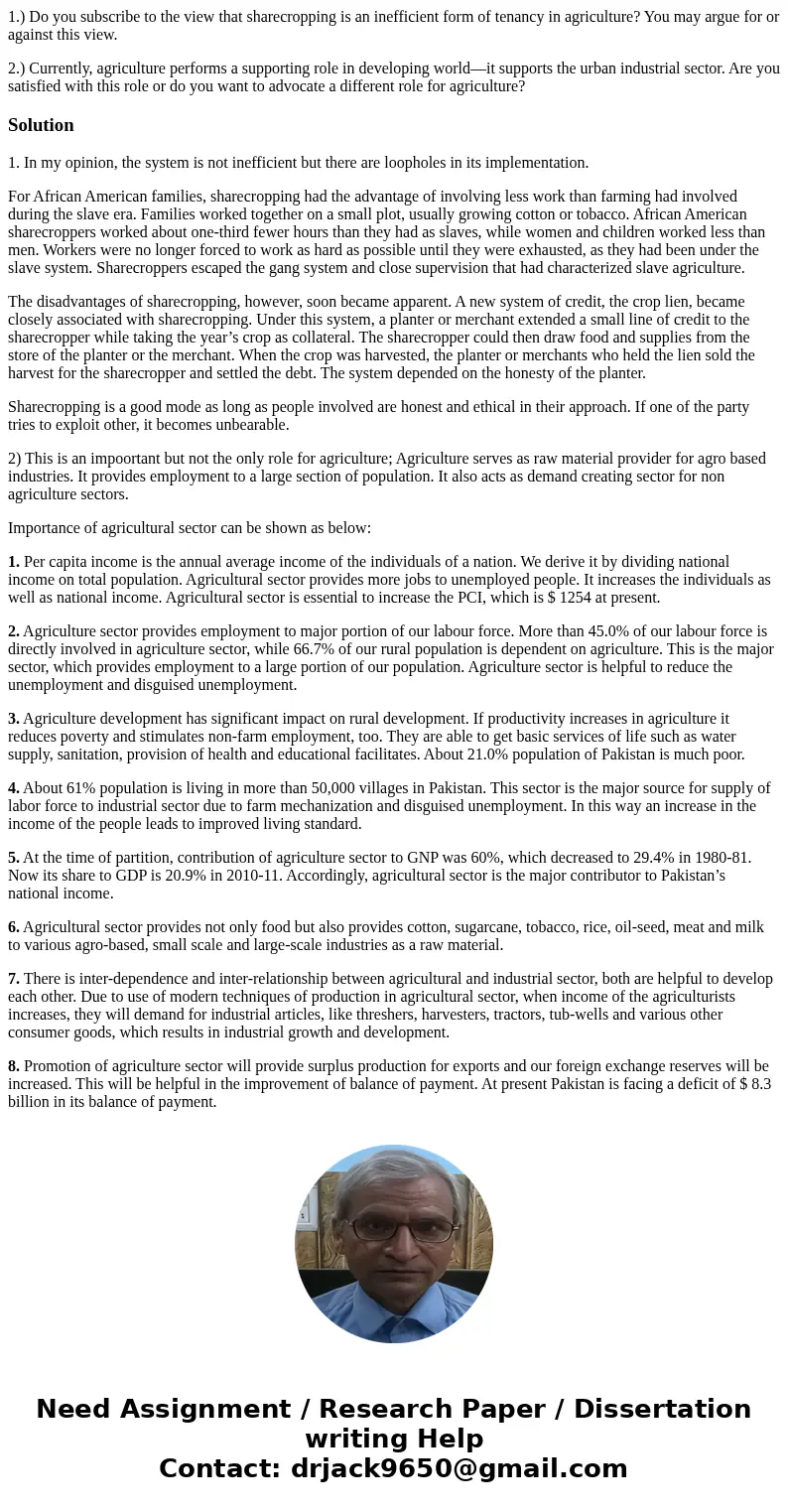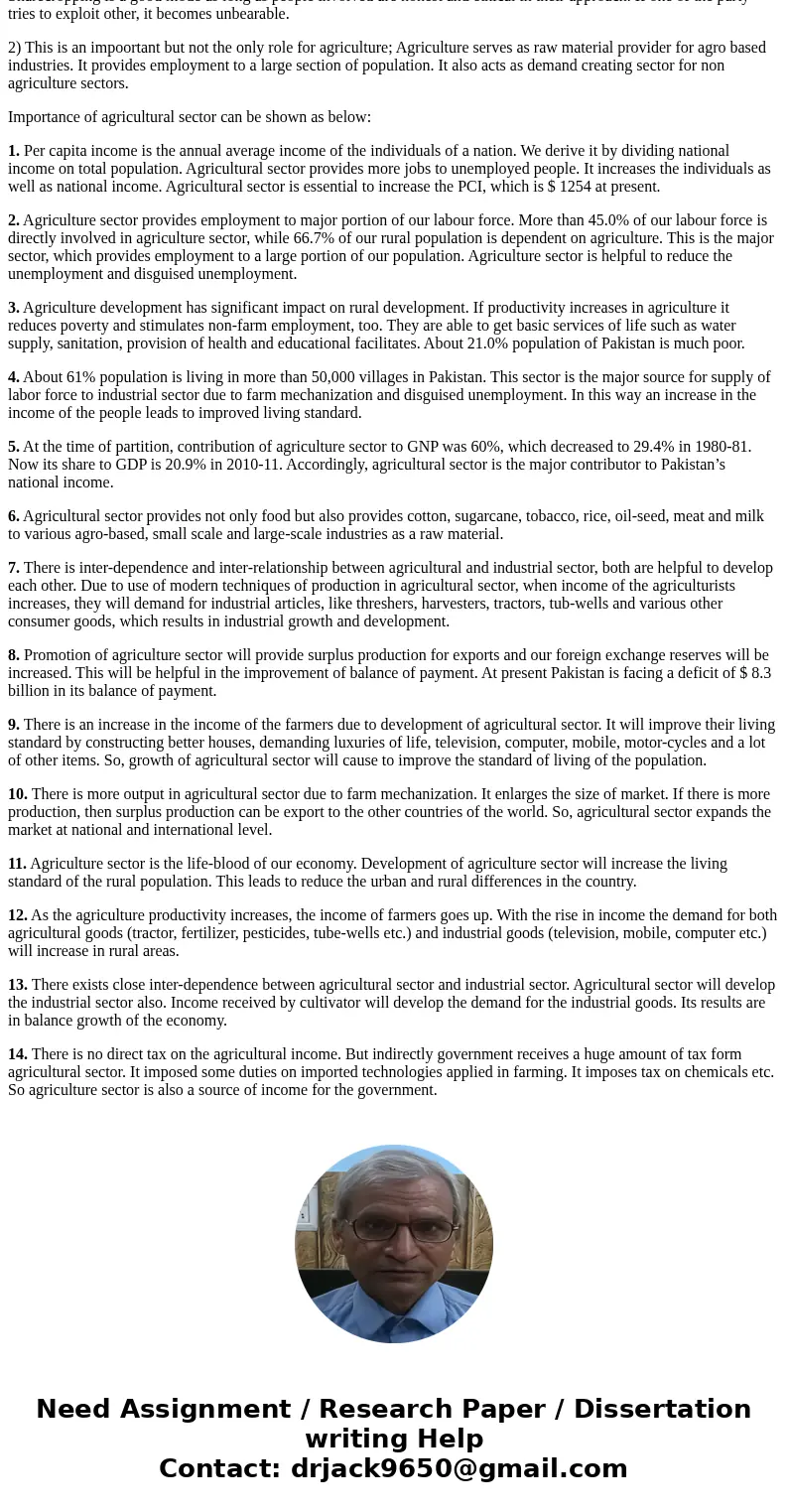1 Do you subscribe to the view that sharecropping is an inef
1.) Do you subscribe to the view that sharecropping is an inefficient form of tenancy in agriculture? You may argue for or against this view.
2.) Currently, agriculture performs a supporting role in developing world—it supports the urban industrial sector. Are you satisfied with this role or do you want to advocate a different role for agriculture?
Solution
1. In my opinion, the system is not inefficient but there are loopholes in its implementation.
For African American families, sharecropping had the advantage of involving less work than farming had involved during the slave era. Families worked together on a small plot, usually growing cotton or tobacco. African American sharecroppers worked about one-third fewer hours than they had as slaves, while women and children worked less than men. Workers were no longer forced to work as hard as possible until they were exhausted, as they had been under the slave system. Sharecroppers escaped the gang system and close supervision that had characterized slave agriculture.
The disadvantages of sharecropping, however, soon became apparent. A new system of credit, the crop lien, became closely associated with sharecropping. Under this system, a planter or merchant extended a small line of credit to the sharecropper while taking the year’s crop as collateral. The sharecropper could then draw food and supplies from the store of the planter or the merchant. When the crop was harvested, the planter or merchants who held the lien sold the harvest for the sharecropper and settled the debt. The system depended on the honesty of the planter.
Sharecropping is a good mode as long as people involved are honest and ethical in their approach. If one of the party tries to exploit other, it becomes unbearable.
2) This is an impoortant but not the only role for agriculture; Agriculture serves as raw material provider for agro based industries. It provides employment to a large section of population. It also acts as demand creating sector for non agriculture sectors.
Importance of agricultural sector can be shown as below:
1. Per capita income is the annual average income of the individuals of a nation. We derive it by dividing national income on total population. Agricultural sector provides more jobs to unemployed people. It increases the individuals as well as national income. Agricultural sector is essential to increase the PCI, which is $ 1254 at present.
2. Agriculture sector provides employment to major portion of our labour force. More than 45.0% of our labour force is directly involved in agriculture sector, while 66.7% of our rural population is dependent on agriculture. This is the major sector, which provides employment to a large portion of our population. Agriculture sector is helpful to reduce the unemployment and disguised unemployment.
3. Agriculture development has significant impact on rural development. If productivity increases in agriculture it reduces poverty and stimulates non-farm employment, too. They are able to get basic services of life such as water supply, sanitation, provision of health and educational facilitates. About 21.0% population of Pakistan is much poor.
4. About 61% population is living in more than 50,000 villages in Pakistan. This sector is the major source for supply of labor force to industrial sector due to farm mechanization and disguised unemployment. In this way an increase in the income of the people leads to improved living standard.
5. At the time of partition, contribution of agriculture sector to GNP was 60%, which decreased to 29.4% in 1980-81. Now its share to GDP is 20.9% in 2010-11. Accordingly, agricultural sector is the major contributor to Pakistan’s national income.
6. Agricultural sector provides not only food but also provides cotton, sugarcane, tobacco, rice, oil-seed, meat and milk to various agro-based, small scale and large-scale industries as a raw material.
7. There is inter-dependence and inter-relationship between agricultural and industrial sector, both are helpful to develop each other. Due to use of modern techniques of production in agricultural sector, when income of the agriculturists increases, they will demand for industrial articles, like threshers, harvesters, tractors, tub-wells and various other consumer goods, which results in industrial growth and development.
8. Promotion of agriculture sector will provide surplus production for exports and our foreign exchange reserves will be increased. This will be helpful in the improvement of balance of payment. At present Pakistan is facing a deficit of $ 8.3 billion in its balance of payment.
9. There is an increase in the income of the farmers due to development of agricultural sector. It will improve their living standard by constructing better houses, demanding luxuries of life, television, computer, mobile, motor-cycles and a lot of other items. So, growth of agricultural sector will cause to improve the standard of living of the population.
10. There is more output in agricultural sector due to farm mechanization. It enlarges the size of market. If there is more production, then surplus production can be export to the other countries of the world. So, agricultural sector expands the market at national and international level.
11. Agriculture sector is the life-blood of our economy. Development of agriculture sector will increase the living standard of the rural population. This leads to reduce the urban and rural differences in the country.
12. As the agriculture productivity increases, the income of farmers goes up. With the rise in income the demand for both agricultural goods (tractor, fertilizer, pesticides, tube-wells etc.) and industrial goods (television, mobile, computer etc.) will increase in rural areas.
13. There exists close inter-dependence between agricultural sector and industrial sector. Agricultural sector will develop the industrial sector also. Income received by cultivator will develop the demand for the industrial goods. Its results are in balance growth of the economy.
14. There is no direct tax on the agricultural income. But indirectly government receives a huge amount of tax form agricultural sector. It imposed some duties on imported technologies applied in farming. It imposes tax on chemicals etc. So agriculture sector is also a source of income for the government.


 Homework Sourse
Homework Sourse